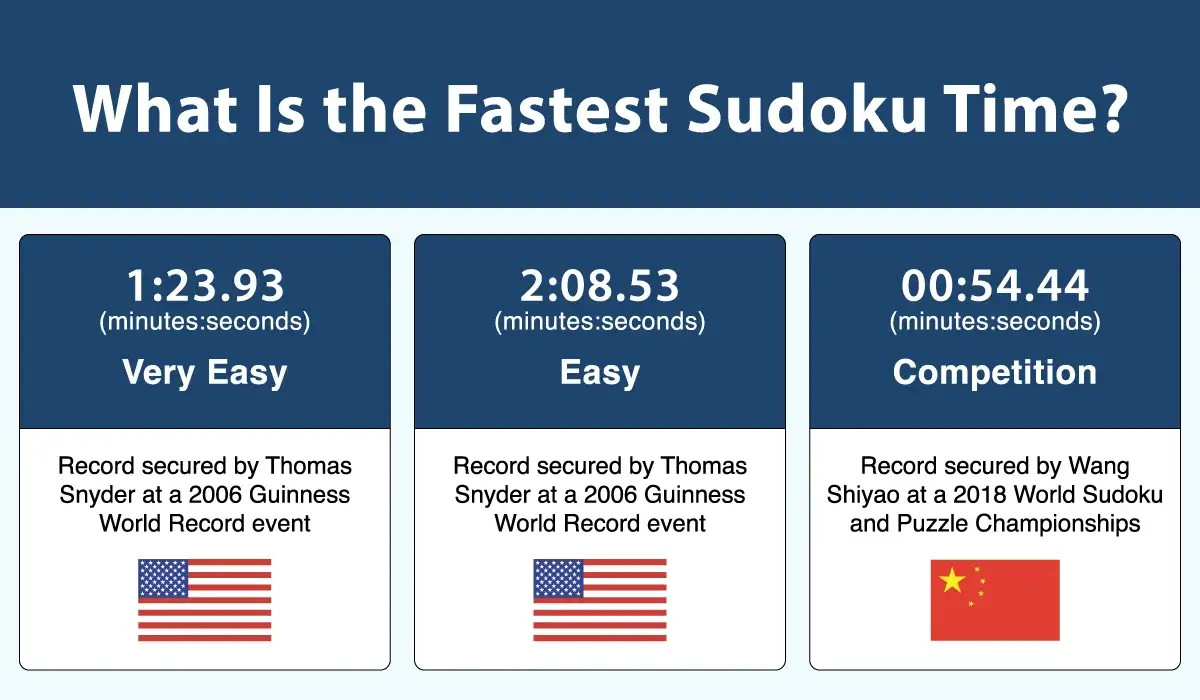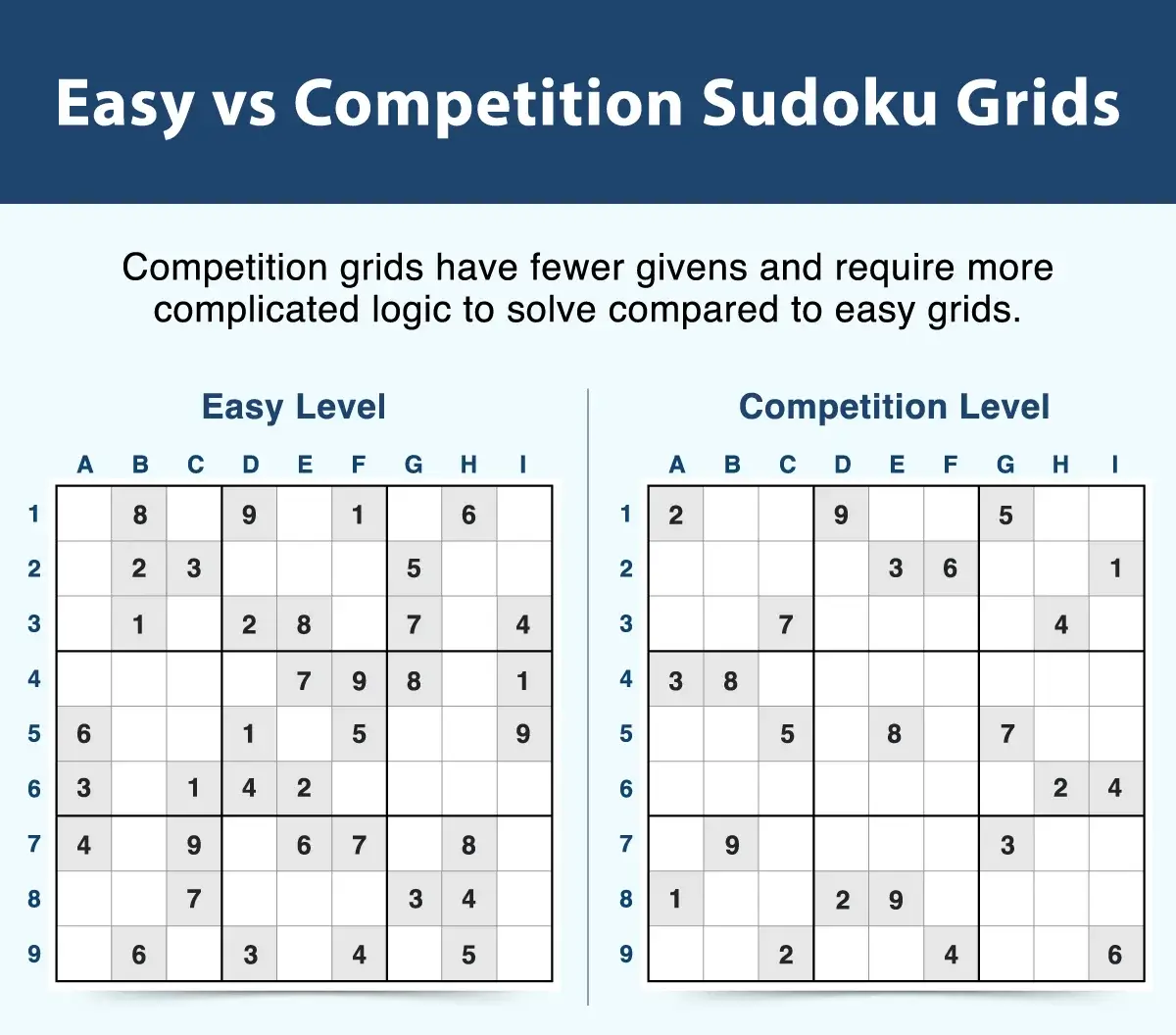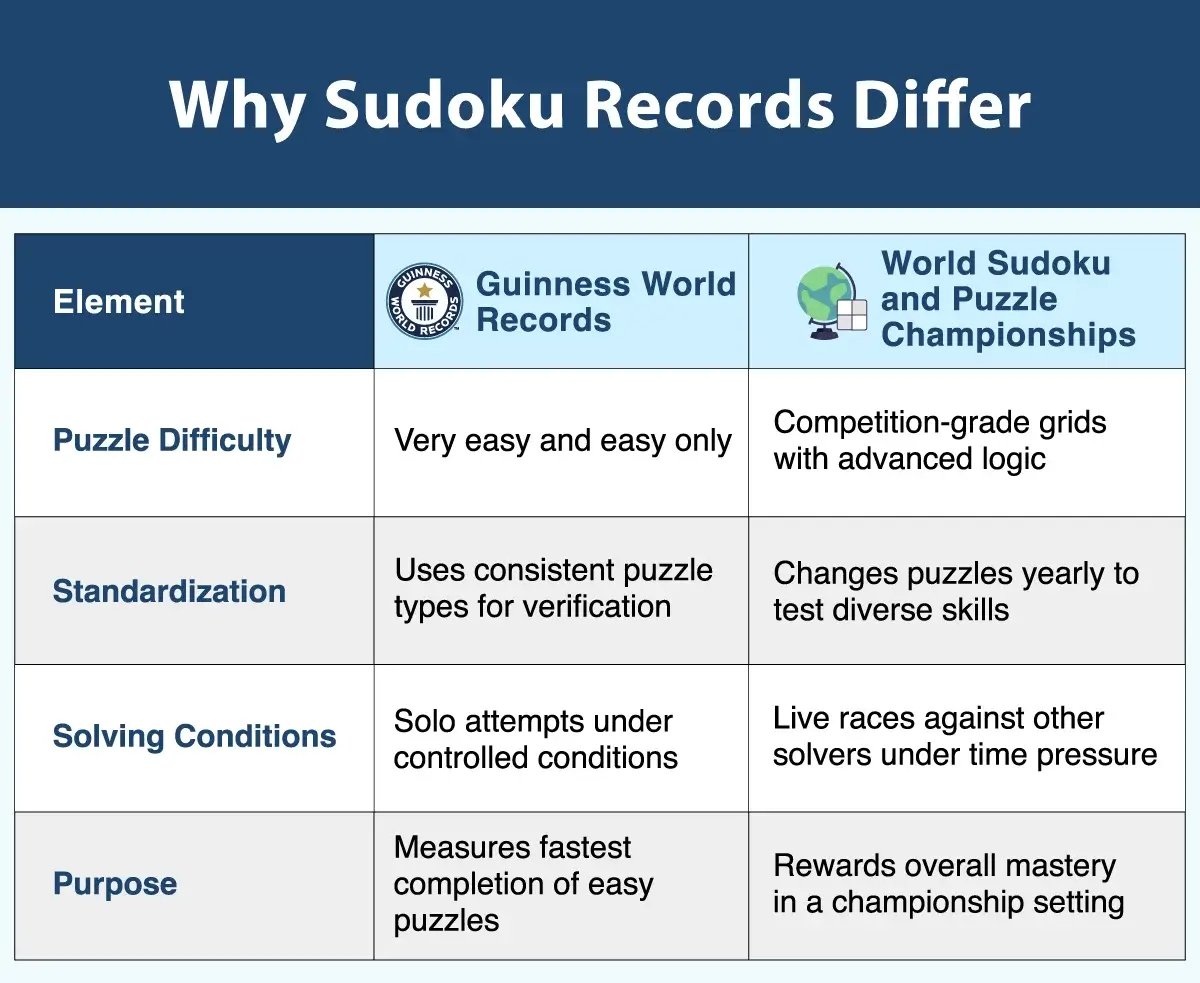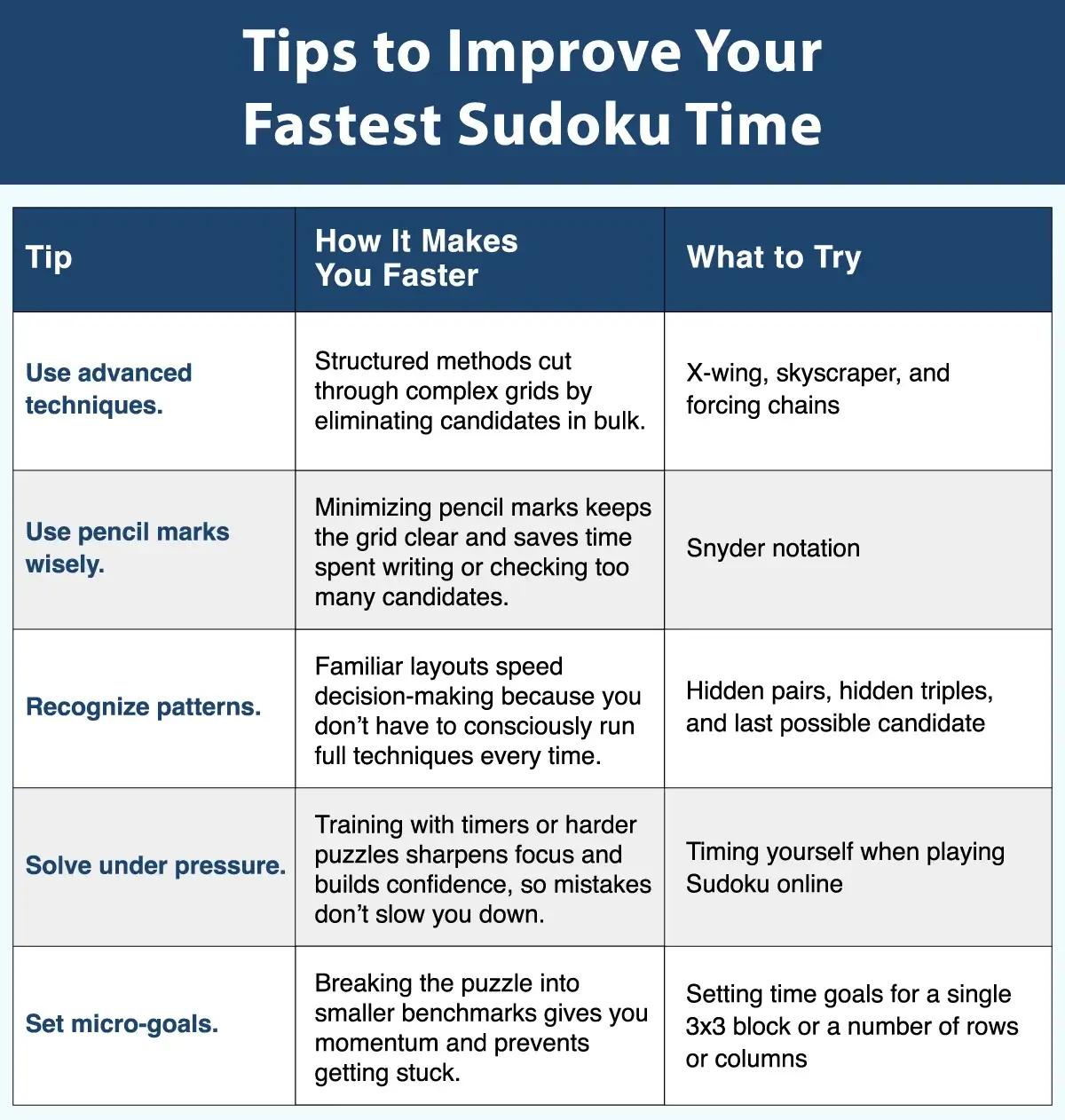Fastest Sudoku Time: World Records, Tips, and Strategies
You may have thought your five-minute solve was pretty impressive, but the current fastest Sudoku times are jaw-dropping:
- Thomas Snyder holds the Guinness World Record for finishing a “very easy" puzzle in just 1:23.93.Yes, that’s measured in minutes and seconds!
- Wang Shiyao set a Sudoku world record by solving a standard 9x9 grid in 54.44 seconds at the World Sudoku & Puzzle Championship in Prague.
These times show what’s possible at the highest level of play, and they also highlight the fun of pushing your own limits. But you don’t need to aim for world-record speed to enjoy the game. By playing Sudoku online, you can track your solving times, experiment with different puzzle types, and set personal records that keep you motivated to improve.
This post takes a closer look at the official records, from Guinness-recognized “easy" puzzles to competition-grade grids, and then offers some strategies and tips that can help you improve your own solving speed.

World’s Fastest Sudoku Times on Record
The fastest time for solving a Sudoku puzzle depends on factors such as puzzle difficulty and organization verifying results. Some records are tracked by Guinness World Records, while others are set at competitions like the World Sudoku & Puzzle Championship (WSPC).
| Time (Minutes:Seconds) | Puzzle Type | Person | Year | Event/Organization | Location |
|---|---|---|---|---|---|
| 1:23.93 | Very Easy Sudoku | Thomas Snyder (USA) | 2006 | Guinness World Records | BookExpo America, Washington DC |
| 2:08.53 | Easy Sudoku | Thomas Snyder (USA) | 2006 | Guinness World Records | BookExpo America, Washington DC |
| 00:54.44 | Classic, Competition-Level 9x9 | Wang Shiyao (China) | 2018 | World Sudoku & Puzzle Championship (WSPC) | Prague, Czech Republic |
Fastest Sudoku Time: Easy Level (2:08.53)
Guinness World Records officially recognizes the fastest completions for the “Very Easy" and “Easy" Sudoku categories. Both of these records were set in 2006 by Thomas Snyder (USA) during BookExpo America in Washington, DC. Measured in minutes and seconds, Snyder completed a Very Easy Sudoku in 1:23.93 and an Easy Sudoku in 2:08.53, achievements that still stand today.
Guinness does not extend its categories to higher difficulty levels. More challenging puzzles can vary greatly in design, making it difficult to create a standardized benchmark. As a result, records for harder Sudoku puzzles are generally tracked through competitive events rather than Guinness.

Fastest Sudoku Time: Competition Level (00:54.44)
In contrast, the World Sudoku & Puzzle Championship showcases the speed of elite solvers on classic 9x9 grids. The fastest recorded time in this setting belongs to Wang Shiyao (China), who solved a championship puzzle in just 54.44 seconds at the 2018 WSPC in Prague. Unlike the Guinness categories, this was a competition-grade puzzle crafted to test pattern recognition, solving technique, and speed under pressure—making Wang’s achievement even more remarkable.

How to Solve Sudoku Faster: Tips from World Championship Play
Depending on your skill level, it may take you anywhere from 5 to 15 minutes to finish an easy, classic Sudoku grid, but while you may not come close to a record-breaking solve, you can always try for a personal best. It all comes down to puzzle type, practice, and the techniques champions use to solve quickly and efficiently.
You don’t have to be at the World Sudoku Championship to benefit from their methods. By adopting a few habits from the world’s best players, you can start solving Sudoku puzzles like a champion and set new personal records.

Use advanced techniques.
The fastest solvers don’t rely on guesswork. They apply advanced Sudoku strategies to spot solutions faster and reduce wasted effort. Learning these methods can transform how quickly you move through any grid, and efficiency depends on following these tips:
- Learn one solving technique at a time. Start with approachable methods like naked pairs or X-wing, then add more advanced tools like skyscraper. By mastering one at a time, you can scaffold from one technique to another while solving.
- Use pencil marks wisely. Many fast solvers skip or limit pencil marks, especially on easy Sudoku puzzles, to save time and keep the grid clean. After all, Snyder notation was named after the technique of record-setting, Thomas Snyder.
- Experiment with online tools. Candidate mode or error-checking on Sudoku Bliss can help you train, but try weaning off them to mimic how champions solve. Perhaps use them when starting a new technique or new difficulty level, but after you become familiar with it, rely on your skill instead of using precious time to check errors or mark too many candidates.
Recognize Patterns
Speed comes from recognizing familiar patterns and maintaining a steady rhythm. Instead of working cell by cell, use these tips to “see" the grid in loops and flows, like the champions do. That way, you can place numbers almost automatically.
- Create a scan routine. Champions move through rows, columns, and boxes systematically. A consistent loop helps prevent missed opportunities.
- Focus on nearly complete units. A row, column, or box with just one or two blanks often provides a quick breakthrough.
- Recognize common number patterns. With practice, grids start to feel familiar. For example, spotting two open cells that “force" a number becomes instinctive.
- Train across different puzzle types. Switching between classic Sudoku, killer Sudoku, and even extreme Sudoku sharpens recognition skills and helps you adapt faster.
Solve Under Pressure
World-class players often solve with a crowd watching and a timer running. While that level of pressure isn’t necessary for casual play, simulating it can help sharpen your focus and improve your decision-making speed. So try these tips to increase your efficiency under pressure:
- Use a timer to simulate competition. Even shaving off 30 seconds per game builds confidence.
- Set micro-goals. Aim to complete the first box or first 20 placements within a certain time limit.
- Challenge yourself with harder puzzles. Playing killer Sudoku or extreme Sudoku forces deeper logic and makes regular classic grids feel easier and faster.
- Practice recovery after mistakes. In competition, even top solvers slip up. The key is to correct quickly and move on without losing momentum.
The fastest Sudoku times in the world prove just how far skill and practice can go. But for most players, the real achievement isn’t breaking a world record or becoming a Sudoku champion. It’s about setting a personal best, mastering new strategies, and enjoying the challenge of each puzzle.
By playing Sudoku online, you can track your own times, test yourself on classic puzzles, and even push into expert or evil Sudoku levels when you’re ready for a bigger challenge. You may not solve in under a minute, but with practice, you’ll be surprised how quickly your speed and confidence grow.